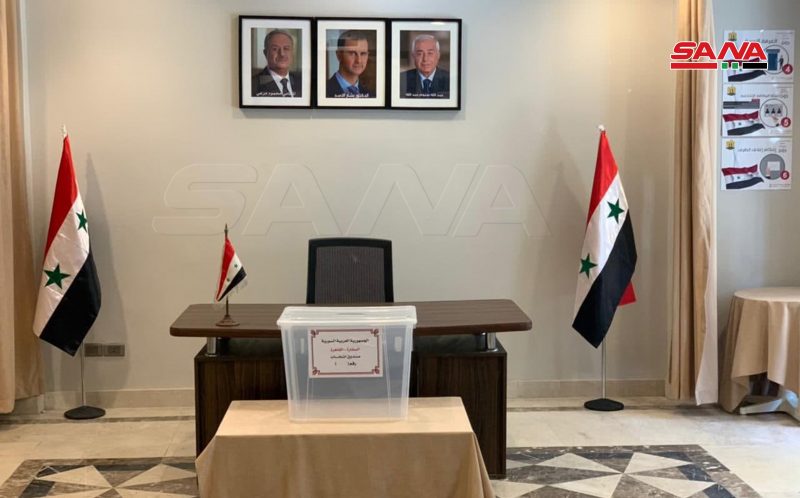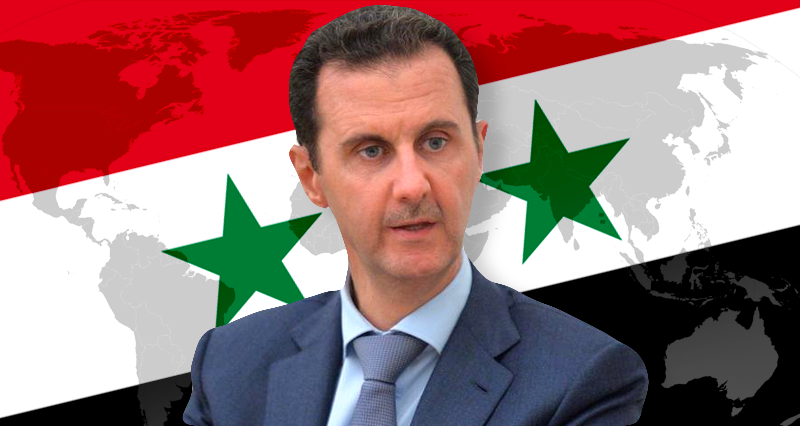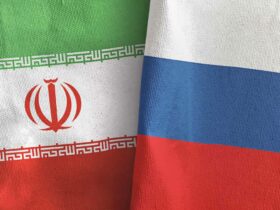The population of the Syrian Arab Republic has gone to presidential elections on May 26th. Ballot boxes were established in all government-controlled areas of Syria and in diplomatic representations of Syria abroad in order to enable expatriates to cast their votes.
The Syrian constitution foresees several legal conditions for approval as a candidate. Among these are being a resident in Syria for at least the last 10 years, not convicted of any crime and having reached the age of 40. Besides, all candidates must present at least 35 supportive signatures from Members of the Syrian Parliament.
The Syrian constitutional court at the end approved the candidacy of three people: current President Bashar al Assad, Mahmoud Ahmad Marei, member of opposition delegation to the UN-led Geneva talks and Abdullah Saloum Abdullah, former State Minister for People’s Assembly Affairs.
The Head of Parliament, Hammouda Sabbagh announced the results on May 27th. Voter turnout was 78% with 14 million Syrians taking part in elections. President Assad received 95.1%, Marei 3.3% and 1.5% of the votes, according to Sabbagh.
Bashar al Assad is thus elected to govern the country for the next 7 years.
Elections contested domestically
The presidential elections were domestically contested. No ballot boxes were established in the areas controlled by the PYD, the Syrian arm of the Kurdish terror group PKK in Turkey, the Turkish controlled regions in the north and those parts of the Idleb province that are dominated by armed terror groups.
The so-called Kurdish Self-Administation, which is supported by US miltary, has even closed the crossings to stop people from voting, as reports Al-Monitor.
While huge crowds demonstrated support for the government and the elections, opposition areas witnessed protests and demands of Assad’s resignation.

Still, government supportive demonstrations were held in some parts of the Aleppo Province, which had long been controlled by opposition forces before the government took over control.
In a symbolic demonstration, Bashar Al Assad casted his vote in Eastern Ghouta, another former opposition stronghold close to Damascus and in 2018 alleged space of a chemical attack.
Foreign countries allowing and prohibiting expatriate voting
A huge numbers of Syrians had to flee the country due to the 10-years-long conflict, making expatriate voting quantitatively important. Other countries reflected their position on the legitimacy of the elections by allowing or prohibiting Syrian diplomatic representations to organize voting in their consulates.
A huge number of countries permitted the election take place, including countries like Lebanon, Jordan, Iraq Egypt, where important numbers of Syrian refugees reside. Media reported that “thousands of Syrians flocked to the embassy in Beirut” to cast their votes.
Further West Asian countries where the elections took place were Bahrain, Oman, Iran, the United Arab Emirates and ballot boxes were established in Malaysia, India, Pakistan, China and Russia.
Some Western countries such as Spain, Belgium, Sweden, Poland and Austria also permitted voting in the according Syrian diplomatic representations.
A very small number of countries on the other hand have not allowed Syrians to take part in elections. These are: The United States, Canada, United Kingdom, Netherlands, Germany, Turkey, Qatar and Saudi Arabia.
While some of these, such as the US and Qatar, do not have functioning Syrian diplomatic representation anymore, others such as Germany and Turkey actively prevented Syrians from voting in their embassies.
The German government declared that it has no obligation “under international law” to permit the elections, thus negatively responding to a formal request by Syrian authorities.
German press reported that the whole street, where the embassy in Berlin is located, was closed of on election day by German police.
The Syrian state news agency reported that voting took place in French capital Paris, but French foreign ministry spokesman Romain Nadal said “The organization of foreign elections on French soil is covered by the Vienna Convention on Consular Relations of April 24, 1963,” he told. “As we are authorized by this convention, French authorities have the right to oppose the holding of this election anywhere on French territory” the spokesman added.
Syria: we reconfirm with the elections our independence and sovereignty
The stance towards voting in embassies reflects a general debate on the legitimacy of the elections and thus, the legitimacy of the elected Syrian government.
Evidently, the Syrian government was the first the outline the importance of the elections, emphasizing that they have taken place in an organized and safe manner.
President al-Assad made after the election the following statement: “At the end of the electoral process and the beginning of the work phase, thanks to all Syrians for their high patriotism and their remarkable participation in this national event. There shall be mercy upon the souls of our martyrs, without whom Syria would not have remained and recovery for our wounded, and salutations to the men of our heroic Syrian Arab Army.”
Speaker of the People’s Assembly Hammoudah al-Sabbagh said the elections succeeded “thanks to heroic deeds and sacrifices of the Syrian Arab Army and bloods of the martyrs who defended Syria’s unity and its independent decision”.
Speaking to various Austrian media organs, Deputy Foreign and Expatriates Minister, Bashar A-Jaafari, stressed that holding presidential election on its date represents a message to the whole world that enemies of Syria will never affect its sovereignty, national independent decision and freedom, whatever the pressures are.
Reactions from the so-called international community were divided, where several countries congratulated Syria for the successful elections, which by other where called a ‘sham’.
Several countries have sent observers to the election on invitation by the Syrian Parliament. These were: Algeria, Oman, Mauritania, Russia, Iran, Armenia, China, Venezuela, Cuba, Belarus, South Africa, Ecuador, Nicaragua and Bolivia.
Soon after the results were declared, the Syrian Presidency started receiving messages of congratulation.
Russia: confirmation of high political authority
Russian President Vladimir Putin send a congratulation telegram to Bashar Al Assad, saying “The voting results fully confirmed your high political authority, the confidence of your fellow citizens in the course under your leadership to stabilize the situation in Syria as soon as possible and strengthen its state institutions,” declared the Kremlin.
China: supporting Syria’s efforts for sovereignty, independence and territorial integrity and looking forward to new progress in friendly cooperation
China also congratulated Syria. Foreign Ministry Spokesperson Zhao Lijian made in the regular press conference on May 28, 2021 the following statement:
“China congratulates President Bashar on his re-election. This year marks the 65th anniversary of the establishment of diplomatic ties between China and Syria featured by longstanding friendship. China firmly supports Syria’s efforts in safeguarding its national sovereignty, independence and territorial integrity, and stands ready to work with Syria to take the 65th anniversary as an opportunity to achieve new progress in our friendly cooperation.”
Iran: important step to peace, stability, reconstruction and prosperity
In a statement made public on Friday, the Iranian Foreign Ministry stated, “holding a successful election as well as the widespread participation of the Syrian people is an important step in establishing peace, stability, tranquility, reconstruction, and prosperity in Syria”.
“The Islamic Republic of Iran respects the decision of the Syrian people and supports the right of the people to determine the future of their country”, the statement added.
The foreign minister of the Bolivarian Republic of Venezuela stated “we congratulate the Syrian people for an exemplary democratic day of the 26th of May. The undeniable triumph of brother President Bashar al Assad is the victory of peace and national sovereignty”.
The abovementioned observing countries, that is, Algeria, Oman, Mauritania, Armenia, Cuba, Belarus, South Africa, Ecuador, Nicaragua and Bolivia also approach the elections as legitimate.
Silent steps towards recognition: Egypt, UAE, Bahrain
Moreover, several countries are taking silent but important steps towards recognizing the Syrian government as the legitimate representative of the Syrian people.
Last month, Egypt’s Foreign Minister Sameh Shoukry declared that the vote allow would the Syrian people to “choose their future” and “form a government that represents them.”
The British newspaper Telegraph interprets already that Egypt may cite the election as reason to readmit Syria to the Arab League, from which it was suspended in November 2011.
The newspaper correctly underlines that the United Arab Emirates, which once supported Syrian rebels, reopened its embassy in Damascus in December 2018, followed shortly afterwards by Bahrain.
The Crown Prince of the UAE, Sheikh Mohammed bin Zayed al-Nahyan had already contacted Syrian President al Assad in March 2020 to discuss precautionary measures on the Covid pandemic, as Reuters has reported.
Normalization with Saudi Arabia ahead?
Similarly, a rapprochement has been taking place between Syria and Saudi Arabia. Right ahead of the elections, Syrian governments tourism minister has arrived in Saudi Arabia on the first such visit by a regime minister to the kingdom in a decade, reported the news agency Anadolu.
Bouthaina Shaaban, a political advisor to Syrian regime president Bashar al-Assad confirmed contacts and said that efforts to improve relations with the Kingdom of Saudi Arabia “could produce positive results soon.”
Beginning of May, Western press reported that Saudi Arabia’s intelligence chief has travelled to Damascus to meet his Syrian counterpart in the first known meeting of its kind since the outbreak of the Syrian war a decade ago.
Shaaban qualified this visit on May 28th as a “positive step”.
Syria’s return to the Arab League
Beyond recognizing the legitimacy of elections, the Iraqi government, Syria’s neighbor to the East, is already calling the Arab League to welcome back Damascus.
First Iraq’s Foreign Minister Fuad Hussein in February 2021, and then the country’s Prime Minister Mustafa Al-Kadhimi, the latter in a meeting with Arab League’s Secretary-General Ahmed Aboul Gheit in Baghdad beginning of April reiterated their support for Syria’s readmission to the Arab League.
Egyptian Foreign Minister Sameh Shoukry had said during the opening session of a March 3 meeting of the Arab League Council: “Syria’s return to the Arab League as a stable and active state would be vital for maintaining Arab national security.”
A few days later, UAE Foreign Minister Sheikh Abdullah bin Zayed Al-Nahyan said: “Syria’s return to the Arab fold is essential and has nothing to do with who wants or who does not want it. It is a matter of public interest and the interests of Syria and the region.”
The West: de-legitimizing elections and resisting normalizations
Opposing these normalizations as well as rejecting the current presidential elections are a number of mainly Western countries.
In a joint statement on May 25, the Secretary of State of the United States of America, the Foreign Secretary of the United Kingdom, and the Foreign Ministers of France, Germany, and Italy called the elections “neither free nor fair”.
The ministers stated:
“We denounce the Assad regime’s decision to hold an election outside of the framework described in UN Security Council Resolution 2254 and we support the voices of all Syrians, including civil society organisations and the Syrian opposition, who have condemned the electoral process as illegitimate.”
The statement continued:
“We urge the international community to unequivocally reject this attempt by the Assad regime to regain legitimacy without ending its grave human rights violations and meaningfully participating in the UN-facilitated political process to end the conflict. We reiterate our firm support for the UN Special Envoy for Syria’s efforts to promote a political settlement, based on all aspects of UNSCR 2254, which protects the future prosperity and the rights of all Syrians, including the right to vote in free and fair elections.”
European Union: elections don’t meet democratic criteria
In a similar line, the EU’s High Representative Josep Borrell declared the elections “met none of the criteria of a genuinely democratic vote, do not contribute to the settlement of the conflict.”
The EU representative also called “for free and fair elections in Syria in accordance with UN Security Council Resolution 2254 and under supervision of the UN”.
The UNSC resolution 2254 from December 2015 calls for or “a Syrian-led political process that is facilitated by the United Nations and, within a target of six months, establishes credible, inclusive and non-sectarian governance and sets a schedule and process for drafting a new constitution, and further expresses its supportfor free and fair elections, pursuant to the new constitution, to be held within 18 months and administered under supervision of the United Nations”.
The Western call was regionally supported by the Turkish Foreign Ministry, which stated “the election held today by the Syrian regime has illegitimate character, as it does not reflect the free will of the Syrian people.”
Turkey supported the UN-led approach.
“The election that was held under unfree and unfair conditions is not only incompatible with the letter and spirit of the UNSC Res.2254, but also demonstrates insincere approach of the regime towards the political process. It is important that the regime is not allowed to exploit the rigged election to gain artificial legitimacy and the UN-facilitated, Syrian-owned and Syrian-led political process continues uninterruptedly”, the ministry said in a declaration.
Conclusion: Syrian government gains ground with elections
In conclusion, the Syrian government gained important ground firstly by having successfully organized the elections without major interruptions or security lacks. The state and security apparatus has proves efficient in government-controlled areas.
Secondly, President Bashar al Assad has been re-elected by millions of voters participating inside Syria and abroad. The country is experiencing huge economic problems partly due to the civil war and partly as a result of the US embargo, still, the government has strengthened its support within the people. At the same time, it has raised expectations to fight the economic crisis.
Thirdly, the important number of countries recognizing election results and participating as observers confirms Syria’s standing in international diplomacy.
Fourthly, Syria’s slow, silent but decided normalization process with Iraq, UAE, Saudi Arabia, Jordan and Egypt opens the country the perspective to smoothen economic crisis by regional cooperation.
Fifth, Western pressure for the so-called “political process”, i.e. to rewrite the country’s constitution in favor a of a federal reform, installing an unstable “government of transition” and heading towards UN-led and US-defined elections is losing effect slowly but surely.
Syria’s presidential elections have not solved the problems of the country. But they have confirmed the Syrian state’s, army’s and people’s path to reunite the country.
For the definitive success in overcoming the crisis, the stance of normalization-resisting regional countries will be crucial.

















Leave a Reply